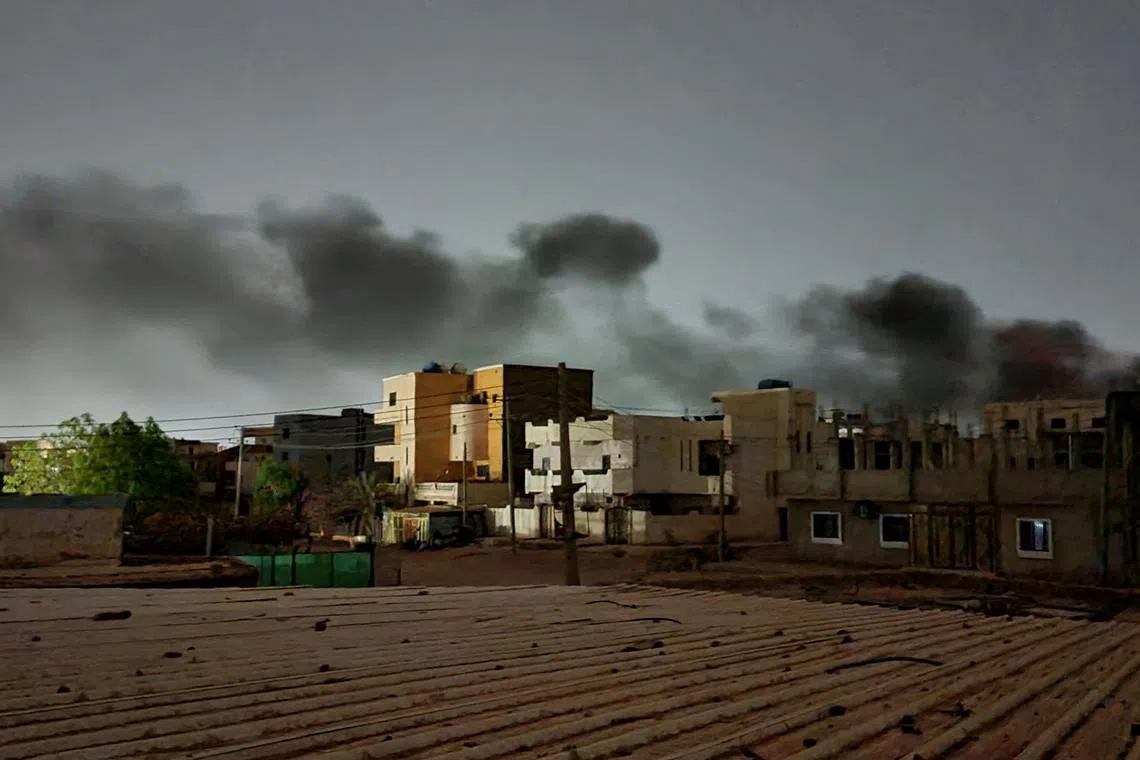Sudan truce extended, but civilians remain trapped as clashes continue
Sign up now: Get ST's newsletters delivered to your inbox

Although the ceasefire had been imperfectly observed, it had allowed the delivery of aid to an estimated two million people.
PHOTO: AFP
KHARTOUM - Fighting flared again in Sudan on Tuesday despite the latest ceasefire pledges of the two warring generals, which are meant to allow desperately needed aid to reach besieged civilians.
Both the army and the paramilitary Rapid Support Forces (RSF) formally agreed late on Monday to extend by five days a humanitarian truce brokered by the United States and Saudi Arabia that had been frequently violated over the past week.
Since the extension was announced, more fighting has been reported by residents, including “clashes with various kinds of weapons in southern Khartoum” and fighting in Nyala in the state of South Darfur.
The army leader, General Abdel Fattah al-Burhan, and his former deputy, RSF commander Mohamed Hamdan Dagalo, again accused each other of violating the truce and claimed to be only responding to enemy aggression.
Although the ceasefire had been imperfectly observed, it had allowed the delivery of aid to an estimated two million people, said the US and Saudi Arabia in a joint statement.
Sudan’s army and the RSF have been locked in a power struggle that erupted into conflict on April 15, killing hundreds and driving nearly 1.4 million people from their homes.
Air strikes, which the army has been using to target RSF forces embedded in neighbourhoods across the capital, could be heard in Omdurman on Monday afternoon, residents said.
“Since yesterday evening, there has been bombardment with all types of weapons between the army and the Rapid Support Forces,” Omdurman resident Hassan Othman, 55, told Reuters by phone.
“We’re in a state of great fear. Where’s the truce?”
On previous days, the truce deal had brought some respite from heavy fighting, though sporadic clashes and air strikes continued.
Saudi Arabia and the US have previously said both sides had committed various violations of the truce, as well as impeded humanitarian access and restoration of essential services.
Orphanage deaths
Sudan’s Health Ministry has said more than 700 people have died as a result of the fighting, though the true figure is likely much higher because of the difficulty health and aid workers have had in accessing conflict zones.
The government has separately recorded up to 510 deaths in El Geneina, one of the main cities in Darfur, a western region already scarred by conflict and displacement.
In Khartoum, factories, offices, homes and banks have been looted or destroyed.
Power, water and telecommunications are often cut, there are acute shortages of medicine and medical equipment, and food supplies have been running low.
At Sudan’s largest orphanage, Reuters reported how dozens of babies have died since the start of the conflict, which one Khartoum State official attributed mainly to staff shortage and recurrent power outages caused by the fighting.
The United Nations and aid groups say that despite the truce, they have struggled to get bureaucratic approvals and security guarantees to transport aid and staff to Khartoum and other places of need.
The head of the UN refugee agency told Reuters that a projection that one million people could flee Sudan by October may be a conservative estimate.
More than 350,000 people have already fled into neighbouring countries, with most heading to Egypt, Chad and South Sudan.
Amid the chaos, the region has been all but cut off from the world, with only sporadic access to power and the Internet.
The UN has warned for weeks that fighting in Darfur’s major cities between the army and the RSF has also drawn in local militias, tribal fighters and armed civilians.
Darfur Governor Mini Minawi, a former rebel leader, has urged citizens to “take up arms” to defend their property. AFP, REUTERS


